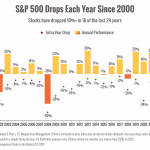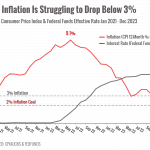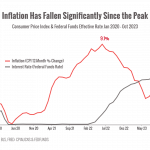Bear Market Truths
 With the new year off to an anxious start for investors, perhaps it’s a good time to remember some essential facts about down markets. Ben Carlson provide a great run down of 10 bear market truths:
With the new year off to an anxious start for investors, perhaps it’s a good time to remember some essential facts about down markets. Ben Carlson provide a great run down of 10 bear market truths:
1. They happen. Sometimes stocks go down. That’s why they’re called risk assets. Half of all years since 1950 have seen a double-digit correction in stocks. Get used to it.
2. They’re a natural outcome of a complex system run by emotions and divergent opinions. Humans tend to take things too far, so losses are inevitable.
3. Everyone says they’re healthy until they actually happen. Then they’re scary and investors who were looking for a better entry point begin to panic.
4. The majority of the people who have been scaring investors by predicting a bear market every single month for the past seven years will be the last ones to put their money to work when one actually hits.
5. It’s an arbitrary number. I have no idea why everyone decided that a 20% loss constitutes a bear market. The media will pay a lot of attention to this definition while it doesn’t matter at all to investors. The 1990s saw zero 20% corrections but two 19% drawdowns. Stocks also lost 19% in 2011. Does that extra 1% really matter?
6. Buy and hold feels great during a long bull market. It only works as a strategy if you continue to buy and hold when stocks fall. Both are much easier to do when stocks rise.
7. Your favorite pundit isn’t going to be able to help you make it through the next one. Perspective and context can help, but there’s nothing that can prepare an investor for the gut-punch you feel when seeing a chunk of your portfolio fall in value.
8. History is a broad outline of what can happen in the markets, not what will happen. Every cycle is different.
9. They’re very difficult to predict. All of the valuations, fundamentals, technicals and sentiment data in the world won’t help you predict when or why investors decide it’s time to panic.
10. These are the times that successful investors separate themselves from the pack. Most investors mistakenly assume that you make all of your money during bull markets. The reason so many investors fail is because they make poor decisions when markets fall.
Source: AWCS







